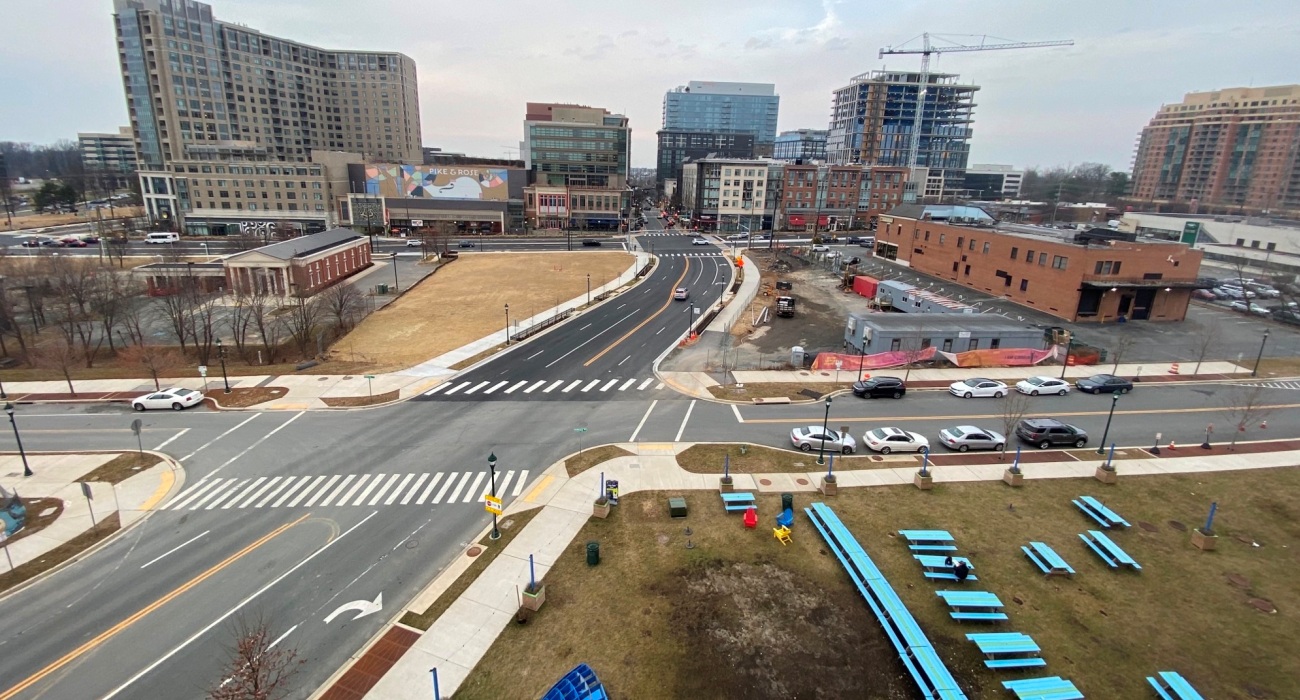Montgomery County Executive Marc Elrich, County Council President Evan Glass, County Councilmembers, County Department of Transportation (MCDOT) Director Chris Conklin, other County officials and community groups this week joined ceremonies at Grand Park Avenue and Banneker Street in North Bethesda to announce the completion of the White Flint West Workaround project. The $74 million construction project supports the future development plans of the Pike District as a walkable, bikeable, public transit-focused epicenter for health computing.
“The completion of the White Flint West Workaround has long been awaited by pedestrians, bicyclists and residents who live in the community,” said County Executive Elrich. “The completion of this project reflects the progress and transformation around the North Bethesda Metro Station, Pike District and the former White Flint Mall site into a dynamic transit-focused community to live, work and play. Our announcement last fall of the incoming University of Maryland—Institute for Health Computing, along with our forthcoming BRT route on 355, has helped establish the Pike District as one of the most exciting areas for growth, development and job creation in the County, State and region.”The announcement was made on the corner of the new crossroad of Grand Park Avenue and Banneker Street. Also joining the event were County Councilmembers Andrew Friedson and Kate Stewart, Bethesda-Chevy Chase Regional Services Office Director Pete Fosselman and Pike District Partnership Board Chair Matt Herrmann.
"We must invest in transportation infrastructure that connects people to the places where they want to be. This project and the Bus Rapid Transit network that will follow are key to unlocking North Bethesda’s potential," said Council President Glass, who chairs the County Council’s Transportation and Environment Committee. "Creating walkable communities and expanding our public transit network is critical to the success of Montgomery County and our region.”
The project, managed by the County Department of Transportation, transforms the road network in the Pike District into more navigable city blocks.
The majority funding source for the project came from the County’s White Flint Special Taxing District tax revenues and related special obligation bonds. Capital Improvement Project funding provided for improvements including shared-use paths, a separated bicycle lane, on-road bicycle lanes, sidewalks, undergrounding of utilities, stormwater management, streetlights and landscape.
MCDOT headed up the design, land acquisition, site improvements, utility relocations and managed construction for the project.
“We are pleased that this project is complete and is an asset that supports future growth in North Bethesda,” said MCDOT Director Conklin. “We’re looking to integrate additional bike connections and a Bus Rapid Transit corridor, known as Flash, along 355 and Old Georgetown Road as well. The White Flint West Workaround construction creates city blocks that will support urban development and are walkable. If you think about what an urban neighborhood looks like, it’s not immense swaths of land with large parking lots along a wide road. It is shorter blocks with cross streets that are walkable and attract businesses that create street fronts. That is what we have now—an infrastructure that will support a new community.”
The local business community and advocacy groups were heavily involved in providing feedback for the project.
“The local community was involved every step of the way,” said Pike District Partnership Board Chair Herrmann. “Community involvement made a big impact on the final design and on the beautiful and highly functional bike and pedestrian paths in the immediate area. We are happy with the result.”
The project realigned the southern portion of Executive Boulevard to connect with Grand Park Avenue, created a new east/west business street Banneker Avenue (previously Main and Market streets) adjacent to the conference center, continued Towne Road (previously Hoya Road) from Montrose to Old Georgetown Road and relocated and reconfigured the intersection of Old Georgetown Road and Executive Boulevard.
The complex project was constructed in two phases. The first phase of construction, which ran from November 2016 to 2017, built Banneker Street and a portion of Grand Park Avenue in front of the Bethesda Marriott North Hotel and Conference Center. The simultaneous construction of a new parking garage on the conference center parking lot, owned by the Montgomery County Revenue Authority, made room for the realigned road.
In 2018, the County acquired the necessary property and finalized plans for the second phase, which ran from January 2019 to December 2022. This phase relocated the intersection of Old Georgetown Road and Executive Boulevard, connected Executive Boulevard to Montrose Parkway via Towne Road and realigned Old Georgetown Road to connect to Banneker Street. It also built the final portion of Grand Park Avenue, completing the link to Old Georgetown Road.
The project area is a hub for major utilities and required extensive relocation of gas, water, electricity and communication lines. Coordination and land swaps with the Maryland Department of Transportation allowed the work to advance. As a result, the County now owns a small stretch of Old Georgetown Road in front of the Pike and Rose development where it connects to Rockville Pike/Route 355. The land was exchanged for Towne Road after the County connected it to the newly configured crossroad at Executive Boulevard and Old Georgetown Road.
The project also integrated wide sidewalks with permeable surfaces to support trees, shared-use paths and sections of protected bike lanes, with curbs that will be painted green this spring.
For more information, visit the White Flint West Workaround Project Page.

